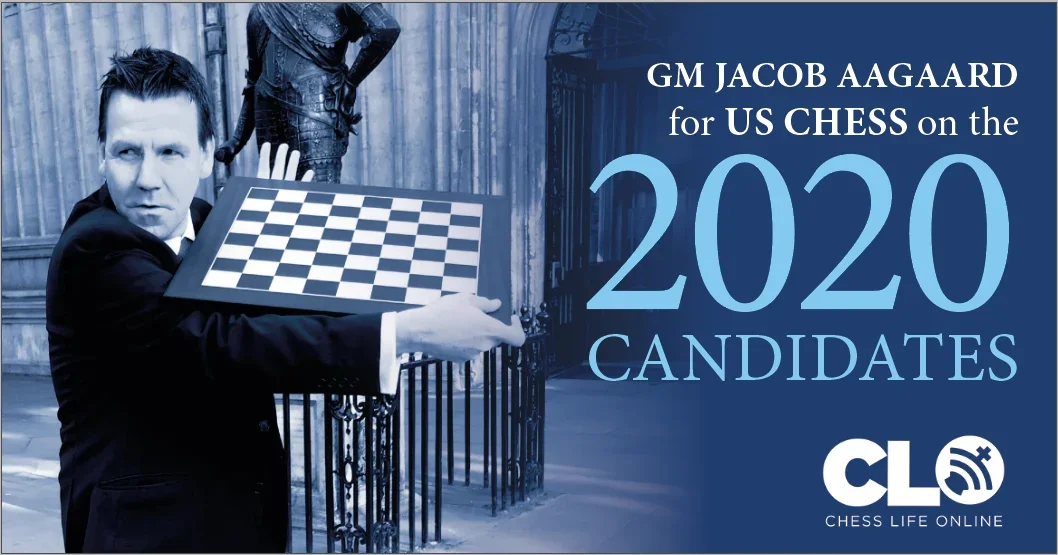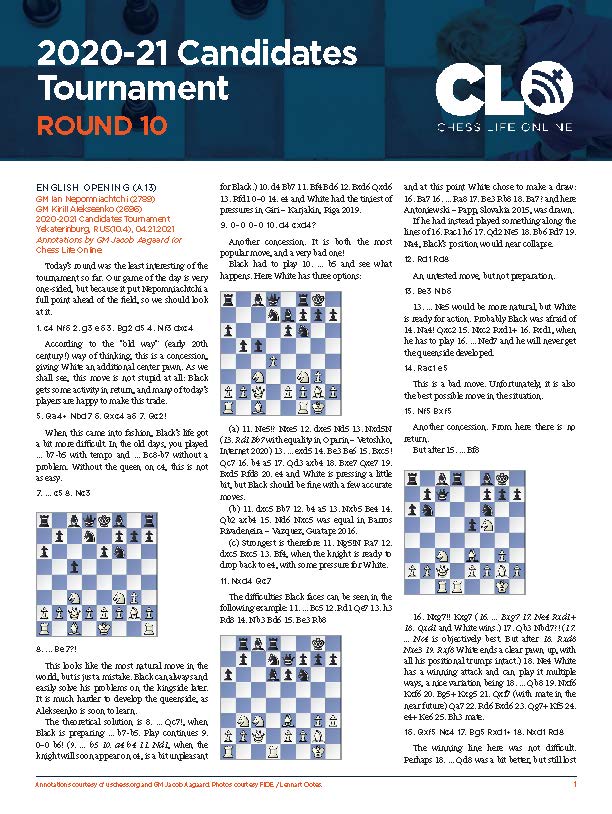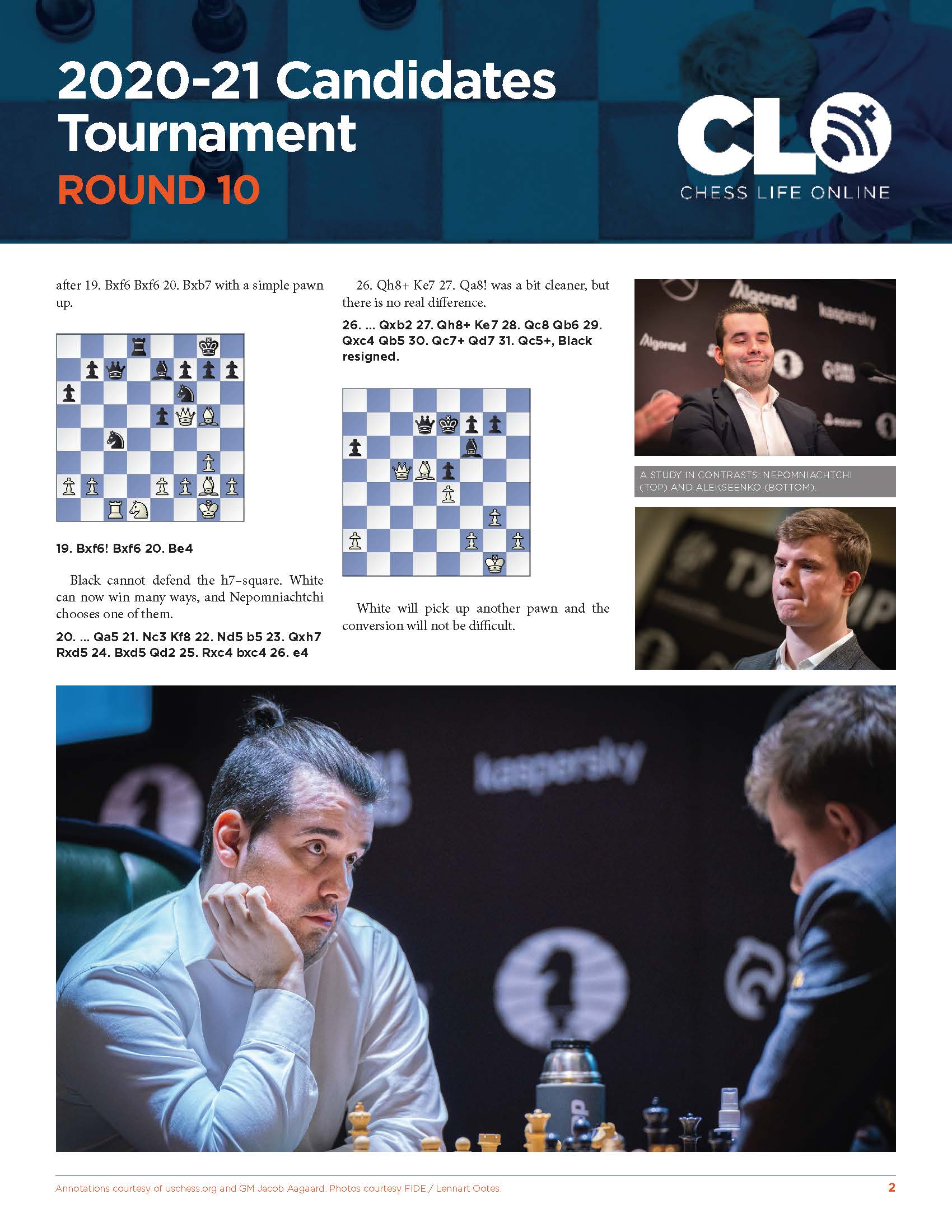For the tenth installment of his “Candidates Game of the Day” series, GM Jacob Aagaard has analyzed GM Ian Nepomniachtchi's important victory over GM Kirill Alekseenko as only he could – deeply, extensively, definitively. This is the analysis that the experts will be quoting tomorrow, and we have it exclusively here at Chess Life Online.

Fans of Aagaard's work may also want to check out his recap of Round 10 on the Killer Chess Training YouTube channel.
https://youtu.be/fu_3yIEnWOg
Below we provide Aagaard’s analysis in replayable format. For those who prefer paper, boards, and pieces, we have created a pdf version.
You can also check out an alternative replayable version posted in the ChessBase Cloud.
[pgn][Event "FIDE Candidates Tournament"] [Site "chess24.com"] [Date "2021.04.21"] [Round "10.4"] [White "Nepomniachtchi, Ian"] [Black "Alekseenko, Kirill"] [Result "1-0"] [ECO "A13"] [WhiteElo "2789"] [BlackElo "2696"] [Annotator "Aagaard"] [PlyCount "61"] [EventDate "2021.??.??"] {Today's round was the least interesting of the tournament so far. Our game of the day is very one-sided, but because it put Nepomniachtchi a full point ahead of the field, so we should look at it.} 1. c4 Nf6 2. g3 e6 3. Bg2 d5 4. Nf3 dxc4 {[#] According to the "old way" (early 20th century!) way of thinking, this is a concession, giving White an additional centre pawn. As we shall see, this is not stupid at all: Black gets some activity in return, and so many of today's players are happy to make this trade.} 5. Qa4+ Nbd7 6. Qxc4 a6 7. Qc2 $1 {When this came into fashion, Black's life got a bit more difficult. In the old days, you played ... b5 with a tempo and ...Bb7 without problem. Without the queen on c4, this is not as easy.} c5 8. Nc3 {[#]} Be7 $6 {This looks like the most natural move in the world, but is just a mistake. Black can always and easily solve his problems on the kingside later. It is much harder to develop the queenside, as Alekseenko is soon to learn.} (8... Qc7 $1 {is the theoretical solution. Black is preparing ... b5.} 9. O-O b6 $1 (9... b5 10. a4 b4 11. Nd1 {, when the knight will soon appear on c4 is a bit unpleasant for Black.}) 10. d4 Bb7 {White can still create something though:} 11. Bf4 Bd6 12. Bxd6 Qxd6 13. Rfd1 O-O 14. e4 {White had the tiniest of pressures in Giri – Karjakin, Riga 2019.}) 9. O-O O-O 10. d4 cxd4 $2 {Another concession. It is both the most popular move, and a very bad one!} ({Black had to play} 10... b5 {, and see what happens. Here White has three options: [#]} 11. dxc5 (11. Ne5 $5 Nxe5 12. dxe5 Nd5 13. Nxd5 $146 (13. Rd1 Bb7 $11 {with equality in Oparin – Vetoshko, Internet 2020.}) 13... exd5 14. Be3 Be6 15. Bxc5 $1 Qc7 16. b4 a5 17. Qd3 axb4 18. Bxe7 Qxe7 19. Bxd5 Rfd8 20. e4 {White is pressing a little bit, but Black should be fine with a few accurate moves.}) ({Strongest is therefore} 11. Ng5 $1 $146 Ra7 12. dxc5 Bxc5 13. Bf4 {, when the knight is ready to drop back to e4, with some pressure.}) 11... Bb7 12. b4 a5 13. Nxb5 Be4 14. Qb2 axb4 15. Nd6 Nxc5 $11 {was equal in Barros Rivadeneira – Vazquez, Guatape 2016.}) 11. Nxd4 Qc7 ({The difficulties Black faces can be seen in the following example:} 11... Bc5 12. Rd1 Qe7 13. h3 Rd8 14. Nb3 Bd6 15. Be3 Rb8 { [#] and at this point White chose to make a draw:} 16. Ba7 ({If he had instead played something along the lines of} 16. Rac1 h6 17. Qd2 Ne5 18. Bb6 Rd7 19. Na4 {, Black's position would getting near to collapse.}) 16... Ra8 17. Be3 Rb8 18. Ba7 $2 {and here Antoniewski – Papp, Slovakia 2015, was drawn.}) 12. Rd1 Rd8 $146 {An untested move, but not preparation.} 13. Be3 Nb6 (13... Ne5 { would be more natural, but White is ready for action. Probably Black was afraid of} 14. Na4 $1 Qxc2 15. Nxc2 Rxd1+ 16. Rxd1 {, when he has to play} Ned7 {, and he will never get the queenside developed.}) 14. Rac1 e5 {This is a bad move. Unfortunately, it is also the best possible move in the situation.} 15. Nf5 Bxf5 {Another concession. From here there is no return.} ({But after} 15... Bf8 {[#]} 16. Nxg7 $3 Kxg7 (16... Bxg7 17. Ne4 Rxd1+ 18. Qxd1 {and White wins.} ) 17. Qb3 Nbd7 $6 (17... Nc4 {is objectively best. But after} 18. Rxd8 Nxe3 19. Rxf8 {White ends a clear pawn up, with all his positional trumps intact.}) 18. Ne4 {White has a winning attack and can play it multiple ways.} Qb8 19. Nxf6 Kxf6 {[#]} 20. Bg5+ Kxg5 21. Qxf7 {with mate in the near future is a nice one.} Qa7 22. Rd6 Bxd6 23. Qg7+ Kf5 24. e4+ Ke6 25. Bh3#) 16. Qxf5 Nc4 17. Bg5 Rxd1+ 18. Nxd1 Rd8 {[#] The winning line here was not difficult.} (18... Qd8 { was a bit better, but still lost after} 19. Bxf6 Bxf6 20. Bxb7 {with a simple pawn up.}) 19. Bxf6 $1 Bxf6 20. Be4 {Black cannot defend the h7-square. White can now win many ways, and Nepomniachtchi chooses one of them.} Qa5 21. Nc3 Kf8 22. Nd5 b5 23. Qxh7 Rxd5 24. Bxd5 Qd2 25. Rxc4 bxc4 26. e4 (26. Qh8+ Ke7 27. Qa8 $1 {was a bit cleaner, but there is no real difference.}) 26... Qxb2 27. Qh8+ Ke7 28. Qc8 Qb6 29. Qxc4 Qb5 30. Qc7+ Qd7 31. Qc5+ {[#] White will pick up another pawn and the conversion will not be difficult.} 1-0 [/pgn]
Previous "Aagaard on the Candidates" installments:
Round 1 - Giri-Nepomniachtchi
Round 2 - Caruana-Alekseenko
Round 3 - Ding Liren-Caruana
Round 4 - Vachier-Lagrave - Grischuk
Round 5 - Nepomniachtchi - Wang Hao
Round 6 - Nepomniachtchi - Ding Liren
Round 7 - Vachier-Lagrave - Nepomniatchtchi
Round 8 - Caruana - Vachier-Lagrave
Round 9 - Giri - Wang Hao
Categories
Archives
- January 2026 (6)
- December 2025 (27)
- November 2025 (29)
- October 2025 (39)
- September 2025 (27)
- August 2025 (29)
- July 2025 (43)
- June 2025 (25)
- May 2025 (24)
- April 2025 (29)
- March 2025 (29)
- February 2025 (20)
- January 2025 (24)
- December 2024 (34)
- November 2024 (18)
- October 2024 (35)
- September 2024 (23)
- August 2024 (27)
- July 2024 (44)
- June 2024 (27)
- May 2024 (31)
- April 2024 (51)
- March 2024 (34)
- February 2024 (25)
- January 2024 (26)
- December 2023 (29)
- November 2023 (26)
- October 2023 (37)
- September 2023 (27)
- August 2023 (37)
- July 2023 (47)
- June 2023 (33)
- May 2023 (37)
- April 2023 (45)
- March 2023 (37)
- February 2023 (28)
- January 2023 (31)
- December 2022 (23)
- November 2022 (32)
- October 2022 (31)
- September 2022 (19)
- August 2022 (39)
- July 2022 (32)
- June 2022 (35)
- May 2022 (21)
- April 2022 (31)
- March 2022 (33)
- February 2022 (21)
- January 2022 (27)
- December 2021 (36)
- November 2021 (34)
- October 2021 (25)
- September 2021 (25)
- August 2021 (41)
- July 2021 (36)
- June 2021 (29)
- May 2021 (29)
- April 2021 (31)
- March 2021 (33)
- February 2021 (28)
- January 2021 (29)
- December 2020 (38)
- November 2020 (40)
- October 2020 (41)
- September 2020 (35)
- August 2020 (38)
- July 2020 (36)
- June 2020 (46)
- May 2020 (42)
- April 2020 (37)
- March 2020 (60)
- February 2020 (38)
- January 2020 (45)
- December 2019 (34)
- November 2019 (35)
- October 2019 (42)
- September 2019 (45)
- August 2019 (56)
- July 2019 (44)
- June 2019 (35)
- May 2019 (40)
- April 2019 (48)
- March 2019 (61)
- February 2019 (39)
- January 2019 (30)
- December 2018 (29)
- November 2018 (51)
- October 2018 (45)
- September 2018 (29)
- August 2018 (49)
- July 2018 (35)
- June 2018 (31)
- May 2018 (39)
- April 2018 (31)
- March 2018 (26)
- February 2018 (33)
- January 2018 (30)
- December 2017 (26)
- November 2017 (24)
- October 2017 (30)
- September 2017 (30)
- August 2017 (31)
- July 2017 (28)
- June 2017 (32)
- May 2017 (26)
- April 2017 (37)
- March 2017 (28)
- February 2017 (30)
- January 2017 (27)
- December 2016 (29)
- November 2016 (24)
- October 2016 (32)
- September 2016 (31)
- August 2016 (27)
- July 2016 (24)
- June 2016 (26)
- May 2016 (19)
- April 2016 (30)
- March 2016 (36)
- February 2016 (28)
- January 2016 (32)
- December 2015 (26)
- November 2015 (23)
- October 2015 (16)
- September 2015 (28)
- August 2015 (28)
- July 2015 (6)
- June 2015 (1)
- May 2015 (2)
- April 2015 (1)
- February 2015 (3)
- January 2015 (1)
- December 2014 (1)
- July 2010 (1)
- October 1991 (1)
- August 1989 (1)
- January 1988 (1)
- December 1983 (1)









